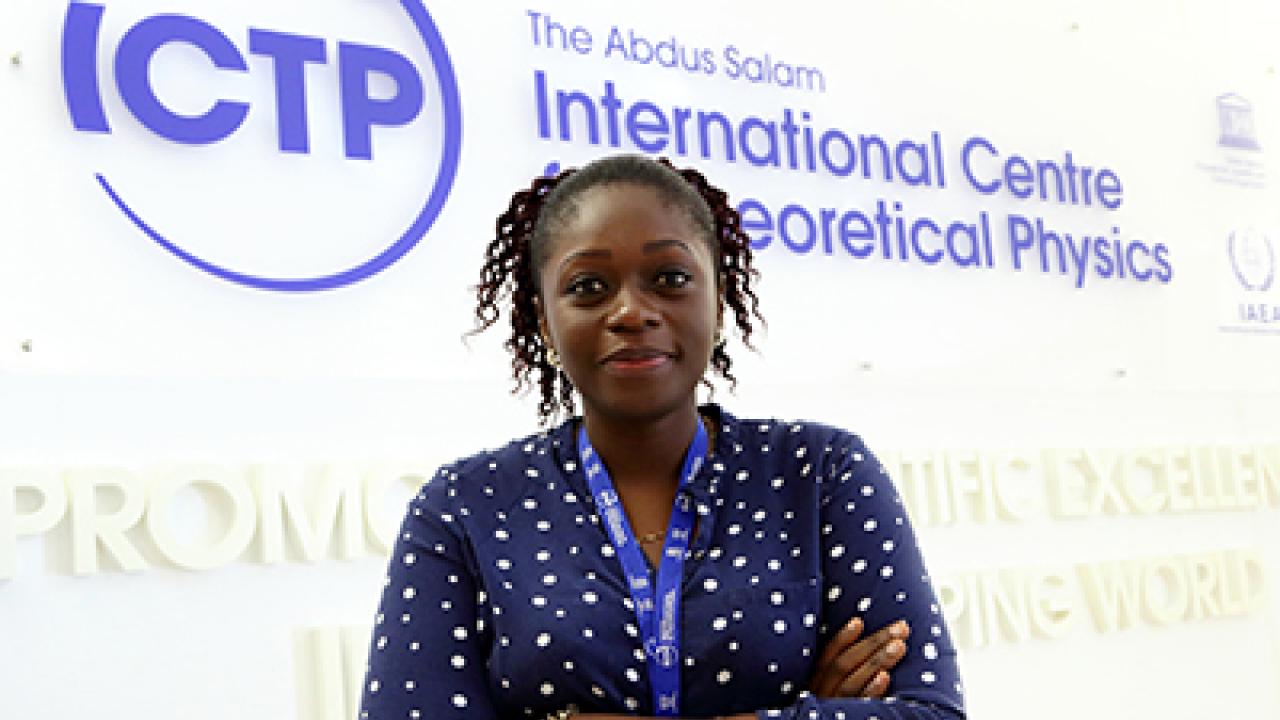
As a child in the war-stricken Republic of Congo, Maryse Nkoua could hardly have predicted that someday she would be attending physics conferences with Nobel Laureates. Yet those tough times at an early age taught her an enduring lesson in the strength of family and friendship that has guided her to where she is today: an ICTP Postgraduate Diploma Programme alumna and PhD graduate determined to discover a vaccine to alleviate the horrors of malaria.
Congo’s civil wars during the 1990s killed thousands, and forced many more to flee its capital, Brazzaville. “I lost my grandmother, and my family lost all of its material possessions when we fled the city,” recalls the young scientist. The upheaval affected her education, too, as Maryse and her siblings missed a year of schooling. But her mother was quick to set things in order again, and soon Maryse was back in school. “My mother always pushed us to excel, even when we were not in a good financial situation,” she explains. While primary school in Congo is free, high school is not, and her mother worked two jobs to ensure a good education for Maryse and her siblings. “She did her best, she wanted us to succeed. She is my inspiration.”
Fortunately, university was nearly free, and it was there that Maryse’s interest in physics--and furthering her education--grew. “My grades were good, and one of my professors, Bernard M'passi Mabiala (an ICTP Senior Associate), recommended ICTP as the next step.” There was one hitch, though: Maryse spoke little English, the language of instruction at the Centre. Well aware of Maryse’s academic capabilities, and confident that she would do well at ICTP in spite of the language deficiency, Professor Mabiala urged her to apply.
ICTP accepted Maryse into its Diploma program in condensed matter physics, setting her on a path of extreme challenges. “I was obliged to learn English. I knew only a few words from songs! Thanks to good friends I had here, they helped me to learn the language, and I had really good professors who were very patient with me.”
Coming to ICTP was her first time away from Congo and Maryse, who had always been surrounded by her family, felt alone. “At the beginning, you get a bit lost, but then you find a second family at ICTP. People here are always nurturing you.”
Maryse, like most Diploma students, found the level of instruction at ICTP very difficult at first. “It was tough, and I worked really hard to be at the level I needed to be. It was really a scale of difference from what I had learned in Congo.” But she lived up to the challenge, thanks partly to the positive reinforcement of the professors. “They pushed us to do our best; they were always telling us ‘you should be the best’. You start to believe that you should not fail, because life after that would be much harder.”
After completing the Diploma course, Maryse was accepted into a PhD program at the University of Trieste; she completed her degree in 2015 with a focus on nanotechnology and nanosciences. To complement her studies, Maryse received valuable hands-on training as a fellow in ICTP’s Training and Research in Italian Laboratories (TRIL) program. TRIL places developing world scientists with one of more than 400 Italian laboratories that make up the TRIL network, to help boost their research careers by collaborating with world-class scientists and using state-of-the-art equipment.
TRIL matched Maryse with Trieste’s NanoInnovationLab at the Elettra Synchrotron. There, she used the lab’s atomic force microscope to develop a device at the nanoscale for the early detection of biomarkers by which particular diseases could be identified.
The studies and practical experience Maryse received thanks to ICTP helped her sharpen her research interest in biophysics. She has returned to her home country as a highly skilled scientist, ready to tackle a new challenge: helping to find a vaccine for malaria. According to the World Health Organization’s World Malaria Report, Sub-Saharan Africa carries a disproportionately high share of the global malaria burden. In 2015, the region was home to 90% of malaria cases and 92% of malaria deaths.
Now based at the University Marien Ngouabi in Brazzaville, Maryse is interested in studying a specific protein related to malaria and sickle cell diseases. “We are trying to characterize and inhibit the protein so that a vaccine could be developed, “ she explains, adding, “We don’t really know how to treat pregnant women who have malaria, what the proper drug is to give them, so my main project is to help in this direction.”
To achieve her goal, Maryse hopes to establish a laboratory at her university that will have technology such as the atomic force microscope that she needs to study proteins at the nanoscale. “I want to bring home this new technology so we can further investigate this protein, and ourselves try to find a solution to this problem,” she says. She is actively seeking funding for the device, aiming to have it in place next year so she can start her investigations.
Acquiring such equipment will not only boost research capacity in Congo, it will also validate the idea that given the right opportunities, scientists from developing countries can overcome adversity to make valuable contributions to the international research community. With help from her family and friends—including those at ICTP--Maryse Nkoua is well on her way to making important discoveries that could benefit all of humanity and becoming a role model for female scientists everywhere.
















